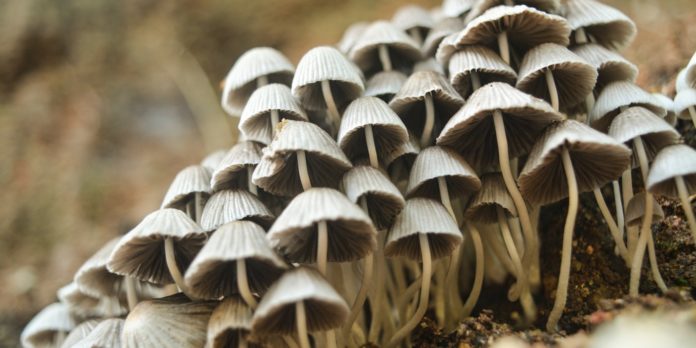Lion’s Mane Mushroom: What Is It?
Lion’s mane, also referred to as Hericium Erinaceus in Latin, is a plant indigenous to North America, Europe, and Asia; consequently, it is not often cultivated in regions that are not in Asia. It is a member of the tooth fungus, also known as the Hydnoid fungi group. It is also known as Hedgehog Mushroom, Yamabushitake, or Houtou.
The long, hanging spines that are characteristic of lion’s mane mushrooms typically measure more than one centimeter in length.
Hericium Erinaceus has spines that project outward rather than within, giving it the distinct appearance of having a lion’s mane. This is in contrast to the majority of mushroom species, which have spines that project from the branch.
The latter half of summer and all of the autumn are prime times to find these mushrooms, which can be found growing on living as well as decaying broadleaf trees.
According to research conducted on cells, animals, and humans, the lion’s mane possesses qualities that are capable of reducing inflammation, boosting the immune system, and providing antioxidant protection.
It has a long history of application as a medicinal mushroom, particularly in the practice of traditional Chinese medicine, which dates back thousands of years.
Lion’s mane mushroom, much like other foods rich in powerfully helpful nutrients, has been known for some time in some regions of Asia to be fantastic for various bodily functions and conditions.
The peculiar-looking fungus has been utilized in Japan for hundreds of years, probably millennia. It is cherished by Buddhist monks, who consider it an almost supernatural source of nourishment.
A group of Buddhist monks known as the Yamabushi wears a robe called the “Suzukake,” which is fashioned from numerous long strands of fur. This robe resembles the lion’s mane mushroom, which is presumably why the mushroom is known as the Yamabushitake in some regions.
According to the accounts of some historical sources, it was once solely accessible to members of the royal family at various times.
Health Benefits of Lion’s Mane Mushroom
Aids in the Relief of Some of the Milder Symptoms Associated With Depression and Anxiety
In developed countries, almost a third of the population may experience symptoms of anxiety or depression during their lifetime.
Even though several different factors might lead to anxiety and depression, chronic inflammation may be a significant influence.
According to recent studies conducted on animals, the extract from lion’s mane mushrooms contains anti-inflammatory properties. It can alleviate the symptoms of anxiety and depression in mice.
Research conducted on animals has shown that the extract of lion’s mane can also help rebuild brain cells and improve hippocampus functioning. The hippocampus is the notable part of the brain responsible for processing memories and emotional reactions.
The reduction in anxious and depressive behaviors seen in mice given these extracts has led researchers to assume that this may be due to an improvement in the hippocampus’s ability to function.
These experiments on animals have shown some positive results, but there hasn’t been much research done on humans.
Eating cookies containing lion’s mane mushrooms daily for one month was found to help lower self-reported sensations of irritability and anxiety in a small trial, including women who had gone through menopause.
Cancer
There is some evidence that the antioxidant qualities of lion’s mane mushrooms could be useful in treating or preventing cancer.
According to the findings of an in vitro study, lion’s mane extracts could be used as a treatment for human leukemia.
These mushroom extracts may also attack cancer cells in the liver, colon, and stomach, according to a study that relied on animal models for its research.
 These findings are encouraging, but it is now difficult to determine if the same effects will be observed in humans.
These findings are encouraging, but it is now difficult to determine if the same effects will be observed in humans.
Helps Patients Recover More Quickly From Injuries to the Nervous System
The brain, the spinal cord, and the several nerves that connect the brain to the rest of the body are all components of the nervous system. These components coordinate their actions in order to send and receive signals that control practically all of the functions of the body.
Trauma to the brain or the spinal cord can have a life-changing effect. They frequently result in paralysis or the loss of mental abilities, and it may take a very long time for their victims to recover.
Research has shown that the extract of lion’s mane mushrooms can assist in speeding up healing from some types of injuries by promoting the growth and repair of nerve cells.
When fed to rats with nervous system injuries, research has revealed that lion’s mane mushroom extract can cut the amount of time needed for recovery by between 23 and 41 percent.
The severity of brain damage that occurs after a stroke may be lessened by using an extract of lion’s mane mushrooms.
One study found that administering high dosages of lion’s mane mushroom extract to rats immediately after a stroke helped reduce inflammation and cut down on the amount of brain damage caused by the stroke by 44%.
Although these findings are encouraging, there have been no studies carried out on humans to assess whether or not the lion’s mane mushroom will have the same curative effect on nervous system damage as it did in the animals.
Diabetes
Managing diabetes successfully requires careful attention to blood sugar levels. One study found that diabetic mice with higher blood sugar levels had reduced blood sugar levels after receiving lion’s mane mushroom extract for a period of four weeks.
Nerve damage is one of the complications of diabetes that can occur as a result of having high blood sugar for a very long period. In 2015, a study on rats indicated that consuming lion’s mane extract for six weeks lowered blood sugar levels, reduced nerve pain sensations, and improved antioxidant activity.
Protects Against the Development of Ulcers in the Digestive System
Any part of the digestive tract, including the stomach, the small intestine, and the large intestine, is a potential location for the development of an ulcer.
The overgrowth of bacteria known as H. pylori and damage to the mucous layer of the stomach, both of which are frequently induced by the use of non-steroidal anti-inflammatory medicines for an extended period of time, are typically the two primary causes of stomach ulcers.
Lion’s mane extract may prevent the development of stomach ulcers by protecting the stomach lining from injury and by inhibiting the growth of H. pylori, the bacterium that is responsible for stomach ulcers.
In a test tube, lion’s mane extract has been found to prevent the growth of H. pylori in a number of experiments. However, none of these studies have examined whether or not the extract has the same effects on the stomach.
In addition, an animal study indicated that lion’s mane mushroom extract was more efficient at avoiding stomach ulcers caused by alcohol than typical acid-lowering medicines, and it did so without causing any adverse side effects.
Inflammation
In addition, the extract of the lion’s mane can lessen inflammation and protect the tissue in other parts of the intestines from being damaged. In point of fact, they may be useful in the treatment of inflammatory bowel illnesses such as Crohn’s disease and ulcerative colitis.
According to the findings of one study, patients with ulcerative colitis who took a mushroom supplement that contained 14% lion’s mane extract saw a significant reduction in symptoms and an improvement in their quality of life after three weeks of treatment.
However, when the same research was conducted on patients suffering from Crohn’s disease, the results showed that the placebo had the same effect as the real treatment.
Because the herbal supplement that was used in this research contained several other kinds of mushrooms, it is quite challenging to make any conclusions about the benefits of lion’s mane in particular. This is a crucial point to keep in mind.
In general, research indicates that lion’s mane extract may be able to help suppress the formation of ulcers; nevertheless, more research on humans is required.
Possible Side Effects
There is a paucity of research regarding the potential risks associated with taking lion’s mane supplements. The little toxicity studies done on it to investigate potential side effects have led researchers to conclude that it is probably harmless.
On the other hand, it is not known whether this is accurate because the supplements have not been subjected to substantial research on humans or because they are risk-free to ingest.
At least one study that was done some time ago suggests that there is a risk of suffering slight pain in the gastrointestinal tract as a result of taking the supplement.
 Participants in this study were given four 250 mg tablets containing 96% lion’s mane dry powder and were instructed to take these pills three times a day for a total of 16 weeks. According to the results of other laboratory investigations, there were no negative consequences.
Participants in this study were given four 250 mg tablets containing 96% lion’s mane dry powder and were instructed to take these pills three times a day for a total of 16 weeks. According to the results of other laboratory investigations, there were no negative consequences.




